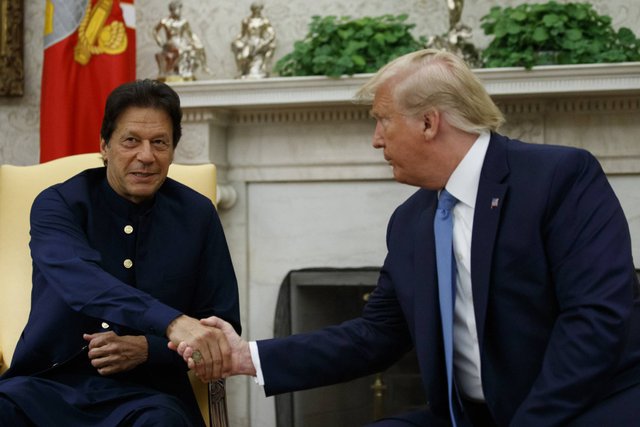Trump pressures Pakistan to stop Taliban fire in Afghanistan
"I could win that war in a week, but I don't want to kill 10 million people," says the US president during the visit of the Pakistani prime minister.

The end of the Afghanistan war and the return of the troops is one of the most anticipated announcements of the last three presidents of the United States. Donald Trump has decided to become the president who succeeds, almost 18 years after the invasion, and with that goal in his head he received this Monday at the White House the Pakistani Prime Minister, Imran Khan. Islamabad pressure is key for the Taliban to accept a ceasefire and negotiate a peace agreement with the Afghan government. In return, Washington will offer economic cooperation to Pakistan, a country that last year suspended $ 300 million in aid and almost all military aid.
Trump and Khan have reasons to try to rebuild a good bilateral relationship after two turbulent years, with direct public and notorious attacks through social networks. This Monday they were friendly with each other and addressed issues such as anti-terrorism, defense, energy or commerce, but one issue stands out above the rest. "The purpose of the visit is to push for Pakistan's cooperation in advancing the peace process in Afghanistan and encourage them to deepen and maintain their recent effort to get tough with the militia and terrorists in their territory," sources said last Friday. of the US Administration. "We are at a critical moment in the peace process and we ask Pakistan to press the Taliban to declare a permanent ceasefire and participate in negotiations that include the Afghan government," they added.
In the Oval office, during the greeting with Khan, Trump answered questions for more than 40 minutes and made some incendiary comments, house brand. "I could win that war in a week, but I don't want to kill 10 million people, do you understand?" He replied to a journalist. Khan, meanwhile, was optimistic. "This is the closest we have been to a peace agreement," he said, noting that it is more than likely that the Taliban "feel to negotiate" with Kabul.
Pakistan has supported the Taliban for years as a way to contain the influence of India in Afghanistan while serving as a US ally in its fight against terrorism since 2001, when it intervened in Afghanistan to eradicate al Qaeda and overthrow to the Taliban. But the conflict has ended up turning into a spider web for Washington and the Trump Administration has pointed to Islamabad. “The United States has foolishly given more than $ 33 billion to Pakistan in the last 15 years, and they have given us nothing except lies and deceptions, believing that our leaders are dumb. They give sanctuary to the terrorists we persecute in Afghanistan with little help. No more! ”Trump wrote on Twitter on January 1, 2018.
More than a year and a half later, the picture has changed. The United States and the Taliban concluded at the beginning of July what is already the seventh round of negotiations, a summit that limped by the absence of representatives of the Government of Kabul, with which the militia refuses to speak at the moment. That blockade is what Washington wants to overcome with Pakistani pressure through. Trump trusted the good results: "I think Pakistan will make a difference, it will save thousands of lives." At the same time, Islamabad relies on US help in its conflict with India over the Kashmir region.
In what seems like a previous gesture of goodwill, Pakistan arrested Hafiz Saeed on Wednesday, considered by the US as the terrorist responsible for the Mumbai attacks. However, Shakil Afridi, the Pakistani doctor who allegedly helped the US to identify Osama bin Laden and for whom the US government is calling for freedom, remains in detention.